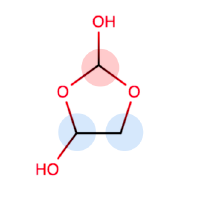Utilities¶
Toolkit wrappers¶
The toolkit wrappers provide a simple uniform API for accessing minimal functionality of cheminformatics toolkits.
These toolkit wrappers are generally used through a ToolkitRegistry, which can be constructed with a desired precedence of toolkits:
from openforcefield.utils.toolkits import ToolkitRegistry
toolkit_registry = ToolkitRegistry()
toolkit_precedence = [OpenEyeToolkitWrapper, RDKitToolkitWrapper, AmberToolsToolkitWrapper]
[ toolkit_registry.register(toolkit) for toolkit in toolkit_precedence if toolkit.is_available() ]
Alternatively, the global toolkit registry (which will attempt to register any available toolkits) can be used:
from openforcefield.utils.toolkits import DEFAULT_TOOLKIT_REGISTRY as toolkit_registry
The toolkit wrappers can then be accessed through the registry:
molecule = Molecule.from_smiles('Cc1ccccc1')
smiles = toolkit_registry.call('to_smiles', molecule)
Registry for ToolkitWrapper objects |
|
Toolkit wrapper base class. |
|
OpenEye toolkit wrapper |
|
RDKit toolkit wrapper |
|
AmberTools toolkit wrapper |
Serialization support¶
Mix-in to add serialization and deserialization support via JSON, YAML, BSON, TOML, MessagePack, and XML. |
Miscellaneous utilities¶
Miscellaneous utility functions.
Inherit docstrings from parent class |
|
Recursively retrieve all subclasses of the specified class |
|
Context to temporary change the working directory. |
|
Get the full path to one of the reference files in testsystems. |
|
Convert an 0.1-compliant SMIRNOFF dict to an 0.2-compliant one. |
|
Convert an 0.2-compliant SMIRNOFF dict to an 0.3-compliant one. |
|
Attach units to dict entries for which units are specified. |
|
Given a dict which may contain some simtk.unit.Quantity objects, return the same dict with the Quantities replaced with unitless values, and a new dict containing entries with the suffix “_unit” added, containing the units. |
|
Checks whether a simtk.unit.Quantity or list of simtk.unit.Quantitys is compatible with given unit. |
|
Serialize a simtk.unit.Unit and return it as a string. |
|
Deserializes a simtk.unit.Quantity from a string representation, for example: “kilocalories_per_mole / angstrom ** 2” |
|
Traverses a SMIRNOFF data structure, attempting to convert all quantities into strings. |
|
Traverses a SMIRNOFF data structure, attempting to convert all quantity-defining strings into simtk.unit.Quantity objects. |
|
Create a mapping of (potentially unit-bearing) quantities from a dictionary, where some keys exist in pairs like {‘length’: 8, ‘length_unit’:’angstrom’}. |
|
Serializes a numpy array into a JSON-compatible string. |
|
Deserializes a numpy array from a JSON-compatible string. |
Structure tools¶
Tools for manipulating molecules and structures
Warning
These methods are deprecated and will be removed and replaced with integrated API methods. We recommend that no new code makes use of these functions.
Process a list of molecules with a specified SMIRNOFF ffxml file and determine which parameters are used by which molecules, returning collated results. |
